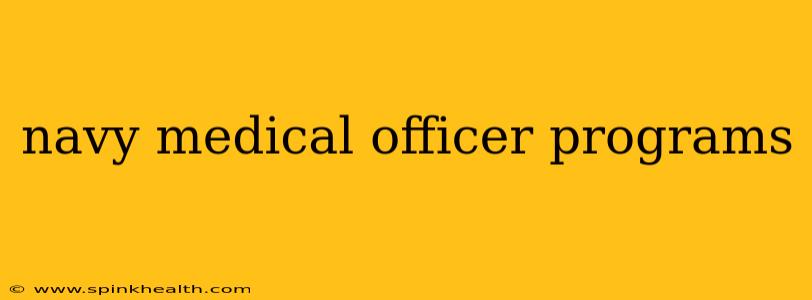Charting Your Course: A Guide to Navy Medical Officer Programs
The crisp white uniform, the unwavering dedication, the profound impact – becoming a Navy Medical Officer is a path less traveled, but one brimming with purpose and opportunity. It's a journey that blends the rigors of medical expertise with the unique challenges and rewards of military service. This isn't just a career; it's a calling, demanding both intellectual prowess and a resilient spirit. Let's navigate the waters of Navy medical officer programs together.
My name is Dr. Evelyn Reed, and for the past fifteen years, I've served as a Navy physician, witnessing firsthand the profound impact this career path offers. I'll guide you through the key aspects of entering this fulfilling world.
What are the different Navy Medical Officer programs?
The Navy offers several pathways to becoming a medical officer, each tailored to different backgrounds and career goals. The most common routes include:
-
Direct Commissioning: This is the typical entry point for physicians who have already completed medical school, residency, and board certification. Direct commissioning allows you to enter the Navy as an officer at a rank commensurate with your experience.
-
Health Professions Scholarship Program (HPSP): This program is designed for medical students. HPSP provides full tuition, a monthly stipend, and a health insurance allowance in exchange for a commitment to serve as a Navy Medical Officer after graduation. This is an excellent option for those pursuing medical school who desire a clear path to military service.
-
Physician Assistant (PA) Program: Similar to the HPSP, the Navy also offers scholarships and commissioning opportunities for Physician Assistants. This pathway allows PAs to serve their country and advance their careers within the Navy's healthcare system.
How competitive are Navy Medical Officer programs?
The competition for Navy Medical Officer programs is understandably high. The Navy seeks top-tier medical professionals with strong academic records, leadership potential, and a commitment to service. A competitive application requires meticulous preparation and a strong demonstration of your suitability for the role.
What are the benefits of being a Navy Medical Officer?
The benefits extend far beyond a competitive salary and comprehensive benefits package (which are certainly attractive). Serving as a Navy Medical Officer offers:
- Opportunities for specialized training: Access to advanced training and specialized skills that may not be readily available in civilian settings.
- Global experience: The chance to serve in diverse locations worldwide, broadening your horizons and enriching your professional experience.
- Leadership development: Significant opportunities to develop leadership skills in a structured and demanding environment.
- Personal fulfillment: The deeply rewarding experience of serving your country and providing crucial healthcare to military personnel and their families.
What are the qualifications for a Navy Medical Officer?
The specific qualifications vary depending on the program, but generally include:
- US Citizenship: This is a fundamental requirement for all programs.
- Medical Degree (for physicians): Completion of an accredited medical school program.
- Residency (for physicians): Completion of a residency program in your chosen specialty.
- Board Certification (for physicians): This is usually required for direct commissioning.
- Physical fitness: Meeting specific physical requirements is essential.
- Background check: A thorough security clearance process is a part of the application.
What is the selection process like?
The selection process is rigorous and multi-faceted. It typically involves:
- Application submission: Completing a detailed application form, providing transcripts, and submitting letters of recommendation.
- Interviews: Multiple interviews with Navy representatives, often including medical evaluations.
- Background checks and security clearances: Thorough investigations into your background and suitability for military service.
- Physical examination: A comprehensive medical examination to ensure you meet the physical demands of the role.
Becoming a Navy Medical Officer is a journey that demands dedication, resilience, and a deep sense of purpose. But for those who embark on this path, the rewards – both personal and professional – are immeasurable. It's a career where you can make a real difference, serving your country while pursuing your passion for medicine. If you're ready to answer the call, begin researching the specific programs and requirements today. Your journey to making a difference begins now.

